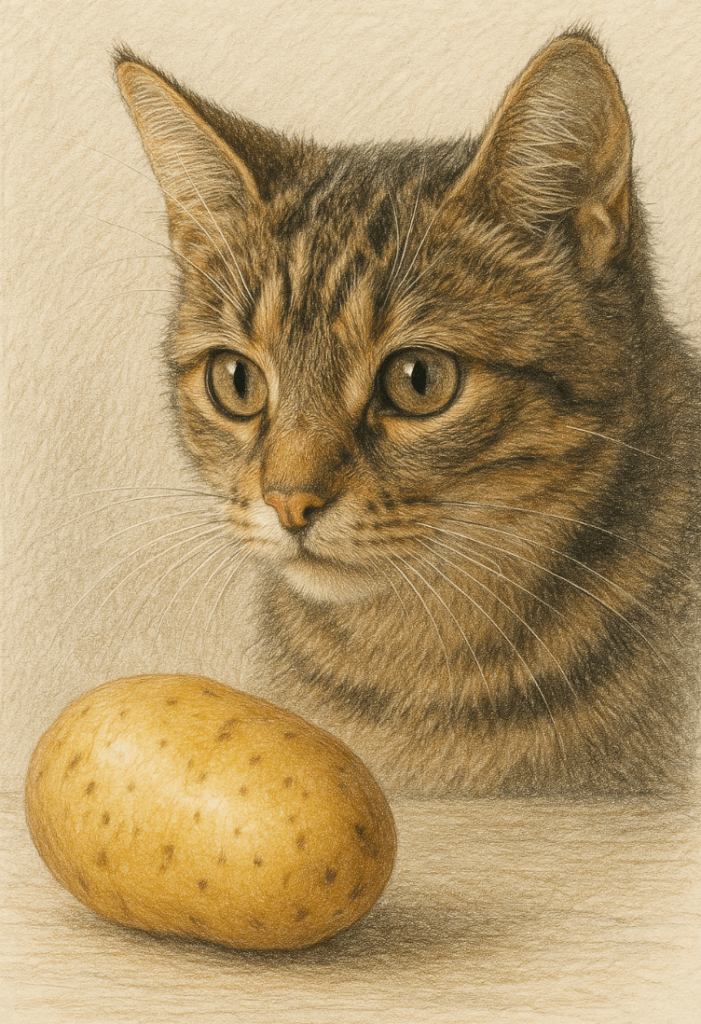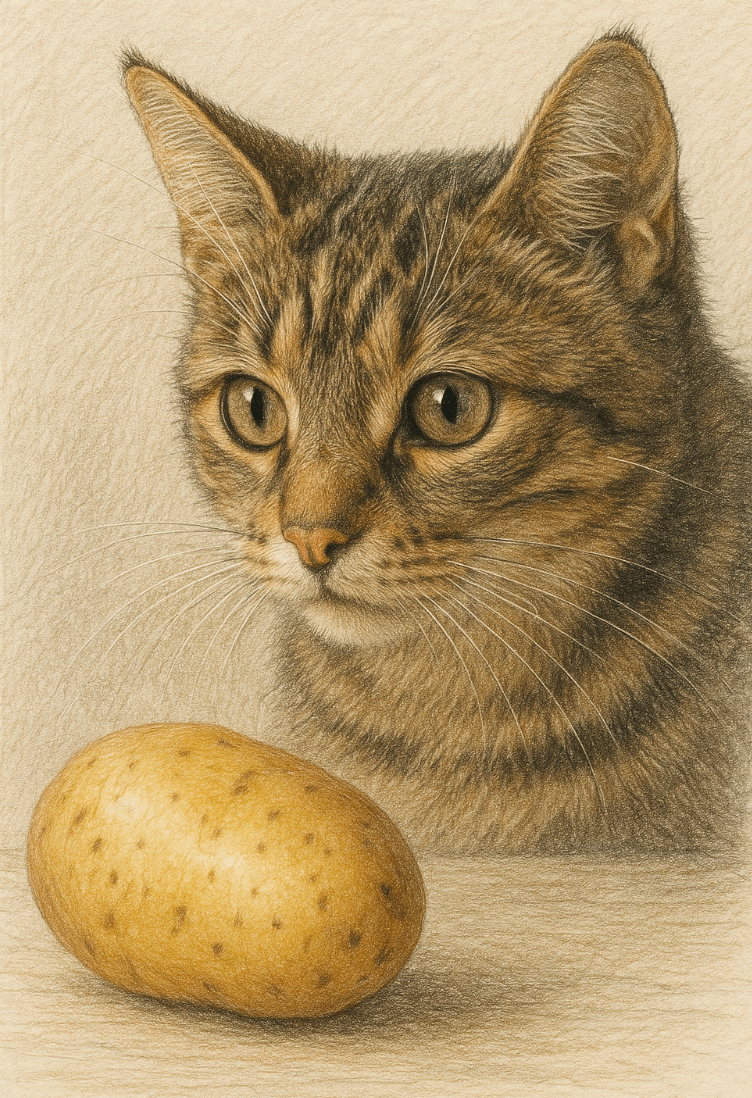Can Cats Eat Potato?
When it comes to feeding our feline friends, many pet owners wonder whether human foods like potatoes are safe for cats. Potatoes are a staple in many households, but can they be shared with your cat? While cats are obligate carnivores and thrive on a meat-based diet, some plant-based foods can be safely introduced in moderation—if prepared correctly. However, not all forms of potatoes are suitable for cats, and certain risks must be considered. In this blog post, we’ll explore whether cats can eat potatoes, the potential benefits and dangers, and how to safely incorporate this food into their diet (if at all).
Potential Risks of Feeding Potatoes to Cats
While potatoes may seem harmless, they come with several risks that every cat owner should be aware of. Understanding these hazards ensures your cat’s safety when considering adding potatoes to their diet.
Raw Potatoes Are Toxic:
Raw potatoes contain solanine, a compound that can be toxic to cats and cause symptoms like vomiting, diarrhea, and lethargy.High Carbohydrate Content:
Cats don’t need carbohydrates in their diet, and excessive consumption can lead to obesity or diabetes over time.Seasonings and Additives:
Many potato dishes include salt, butter, garlic, or spices, which are harmful to cats and can upset their digestive systems.Choking Hazards:
Large chunks of potato or potato skins can pose choking risks, especially for smaller cats or kittens.Digestive Upset:
Even cooked potatoes can cause gastrointestinal issues if introduced too quickly or in large quantities.
These risks highlight why caution is essential when offering potatoes to your cat. Always prioritize their health and consult a veterinarian before making dietary changes.
Benefits of Potatoes for Cats (When Prepared Safely)
While potatoes aren’t a necessary part of a cat’s diet, they do offer some minor benefits when prepared and served appropriately. These advantages are limited but worth noting.
Source of Energy:
Cooked potatoes provide easily digestible carbohydrates, which can serve as a temporary energy boost for active cats.Low-Fat Option:
Plain, boiled potatoes are low in fat, making them a safer choice compared to fatty meats or dairy products.Hydration Support:
Adding small amounts of mashed potato mixed with water can help increase hydration for cats who struggle to drink enough water.Nutrient Content:
Potatoes contain small amounts of vitamins like B6 and C, which can support overall health when included in moderation.Variety in Diet:
For picky eaters, plain mashed potato can add texture and variety without introducing harmful ingredients.
While these benefits exist, they must be weighed against the potential risks to determine if potatoes are truly suitable for your cat.
Check this guide 👉Can Cats Eat Plantains? Best 7 Expert Tips!
Check this guide 👉Can Cats Eat Plums? Best 7 Expert Tips!
Check this guide 👉Can Cats Eat Goldfish? Best 7 Expert Tips!

Safe Ways to Serve Potatoes to Cats | Unsafe Potato Preparations for Cats |
|---|---|
Plain boiled or steamed potatoes | Raw or uncooked potatoes |
Mashed potatoes without seasoning | French fries or chips |
Small, bite-sized pieces | Potato skins or peels |
Mixed with cat-safe proteins | Potatoes with added salt or spices |
Served in moderation as an occasional treat | Instant mashed potatoes with additives |
How to Safely Introduce Potatoes to Your Cat’s Diet
If you decide to give your cat potatoes, it’s crucial to take precautions to minimize risks. Follow these guidelines to ensure a safe experience.
Choose Plain, Cooked Potatoes Only:
Avoid any form of seasoning, oil, or butter, as these can upset your cat’s stomach.Start with Small Portions:
Introduce tiny amounts of potato to monitor how your cat reacts before offering more.Remove Skins and Peels:
Potato skins can be difficult to digest and may contain higher levels of solanine.Monitor for Allergic Reactions:
Watch for signs of allergies, such as itching, swelling, or digestive issues, after feeding potatoes.Consult Your Veterinarian:
Before adding new foods to your cat’s diet, seek professional advice to ensure it aligns with their nutritional needs.
By following these steps, you can mitigate risks while allowing your cat to enjoy the occasional potato treat.
Signs Your Cat May Be Struggling with Potato Consumption
Even with precautions, complications can arise if your cat consumes potatoes improperly. Watch for these warning signs to act quickly if something goes wrong.
Vomiting or Diarrhea:
These symptoms may indicate that your cat has eaten too much potato or consumed something toxic.Lethargy or Weakness:
A sudden lack of energy could signal poisoning from solanine or other harmful compounds.Difficulty Breathing:
Choking on potato chunks or allergic reactions can cause respiratory distress.Loss of Appetite:
If your cat refuses to eat after trying potatoes, it may indicate digestive upset or discomfort.Swollen Face or Paws:
Swelling is often a sign of an allergic reaction and requires immediate veterinary attention.
Recognizing these signs early allows you to seek veterinary care promptly, preventing further complications.
Common Mistakes to Avoid When Feeding Potatoes to Cats
Feeding potatoes to your cat requires careful consideration to avoid mistakes that could endanger their health. Here are some pitfalls to watch out for.
Offering Raw Potatoes:
Raw potatoes contain solanine, which is toxic to cats and can cause serious health issues.Adding Seasonings or Spices:
Salt, garlic, and onion powder are harmful to cats and should never be included in their food.Ignoring Portion Sizes:
Feeding too much potato can lead to weight gain or digestive problems due to its high carbohydrate content.Leaving Potato Skins On:
Potato skins are harder to digest and may contain higher concentrations of toxins.Assuming All Cats React the Same Way:
Every cat is different; what works for one may not work for another, so always monitor their response.
Avoiding these mistakes ensures a safer and healthier experience for your cat.
Alternatives That Mimic the Benefits of Potatoes
If you’re hesitant about feeding potatoes to your cat, there are plenty of alternatives that mimic their benefits without the associated risks.
Cooked Pumpkin:
Rich in fiber and nutrients, cooked pumpkin aids digestion and supports urinary health.Plain Chicken or Turkey:
Lean proteins provide essential amino acids that cats need for optimal health.Boiled Carrots:
Soft, boiled carrots offer vitamins and minerals without the risks associated with potatoes.Cat-Safe Wet Food:
High-quality wet food provides hydration and balanced nutrition tailored to feline needs.Bone Broth (Unsalted):
Strained, sodium-free bone broth offers flavor and nutrients without harmful additives.
These alternatives allow you to cater to your cat’s instincts while keeping them safe.
Understanding Your Cat’s Nutritional Needs
Cats are obligate carnivores, meaning their bodies are designed to thrive on a meat-based diet. Understanding their unique nutritional requirements helps explain why potatoes should only play a minimal role—if any—in their meals.
High Protein Requirements:
Cats need animal-based proteins to meet their amino acid needs, particularly taurine, which is essential for heart and eye health.Limited Carbohydrate Tolerance:
Unlike humans, cats don’t benefit significantly from carbohydrates and may suffer health issues if fed too many.Hydration Through Food:
Cats often don’t drink enough water, so wet food or moisture-rich alternatives are better than dry snacks like potatoes.Essential Fatty Acids:
Omega-3 and omega-6 fatty acids support skin, coat, and overall health, found primarily in fish and meat sources.Importance of Balanced Diets:
Commercial cat foods are formulated to provide complete nutrition, reducing the need for supplemental foods like potatoes.
By recognizing these needs, you can make informed choices that prioritize your cat’s long-term health and happiness.
Frequently Asked Questions About Cats and Potatoes
Can cats eat mashed potatoes?
Yes, plain mashed potatoes without seasonings or additives are safe in small amounts.
Are sweet potatoes safe for cats?
Sweet potatoes are generally safer than regular potatoes but should still be served plain and in moderation.
What happens if my cat eats raw potato?
Raw potatoes contain solanine, which can be toxic to cats. Contact your vet immediately if this occurs.
How often can I give my cat potatoes?
Potatoes should only be given occasionally as a treat, not as a regular part of their diet.
Can kittens eat potatoes?
Kittens have sensitive digestive systems, so it’s best to avoid giving them potatoes altogether.
Prioritizing Your Cat’s Health When It Comes to Potatoes
Feeding potatoes to your cat can be safe if done carefully, but it’s important to remember that they are not a necessary part of a feline’s diet. While plain, cooked potatoes offer minimal benefits, the risks associated with improper preparation or overfeeding outweigh these advantages. By understanding the potential dangers, choosing safer alternatives, and consulting your veterinarian, you can ensure your cat stays healthy and happy. Remember, your furry friend relies on you to make the best dietary choices for them—so always prioritize their well-being above all else.
Do Cats Have Taste Buds? Best 7 Expert Tips! – Discover how cats experience flavors and why their taste is so unique.
Do Dogs Have Taste Buds? Best 7 Expert Tips! – Discover how dogs experience taste, their preferences, and what it means for their diet and health.
Can Cats Taste Sweet? Best 7 Expert Tips! – Discover why cats can’t taste sweetness, how it affects their diet, and tips to keep them healthy and happy.
Can Dogs Taste Sweet? Best 7 Expert Tips! – Discover how dogs perceive sweetness, which foods are safe, and tips to manage their sweet cravings responsibly.





